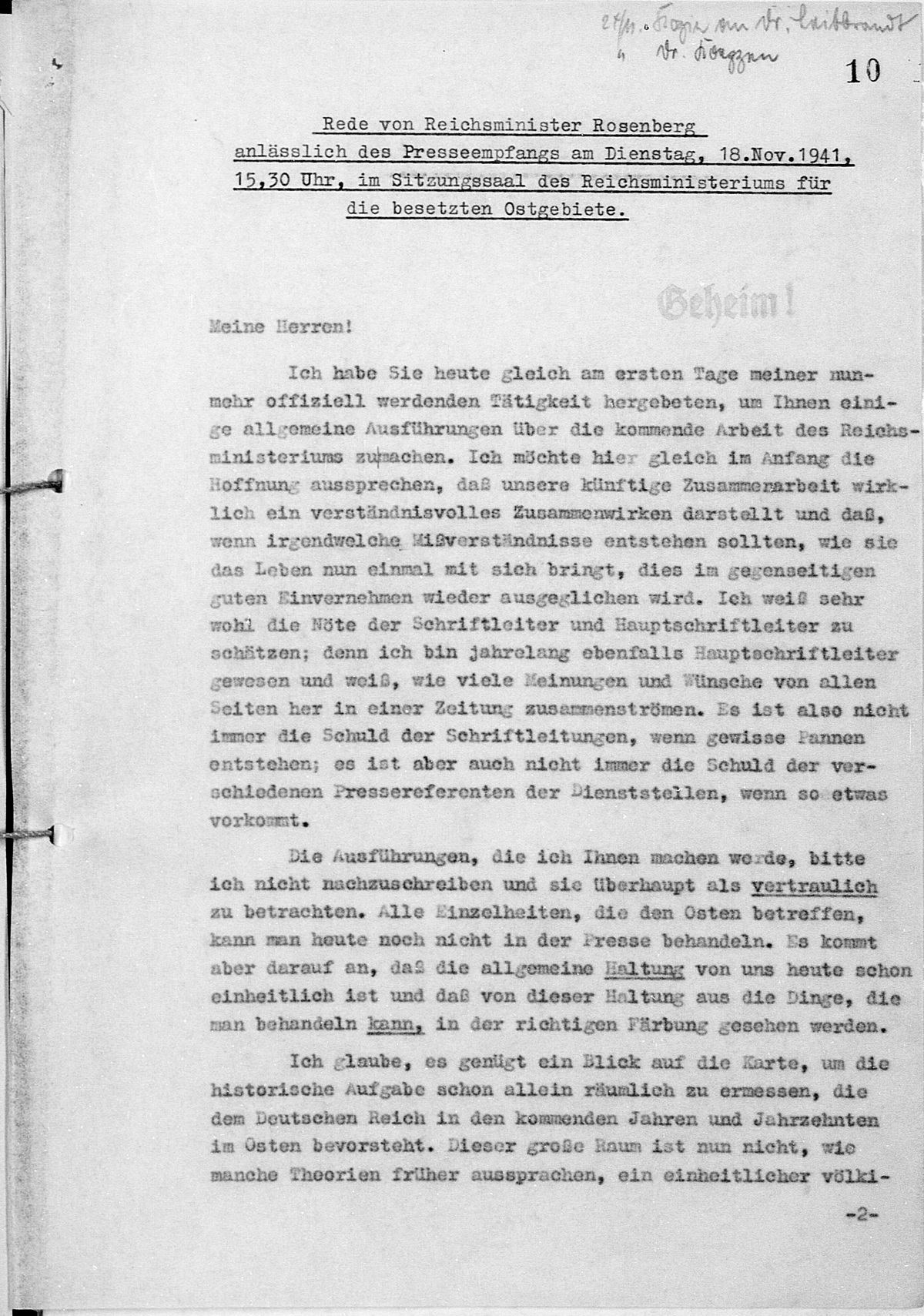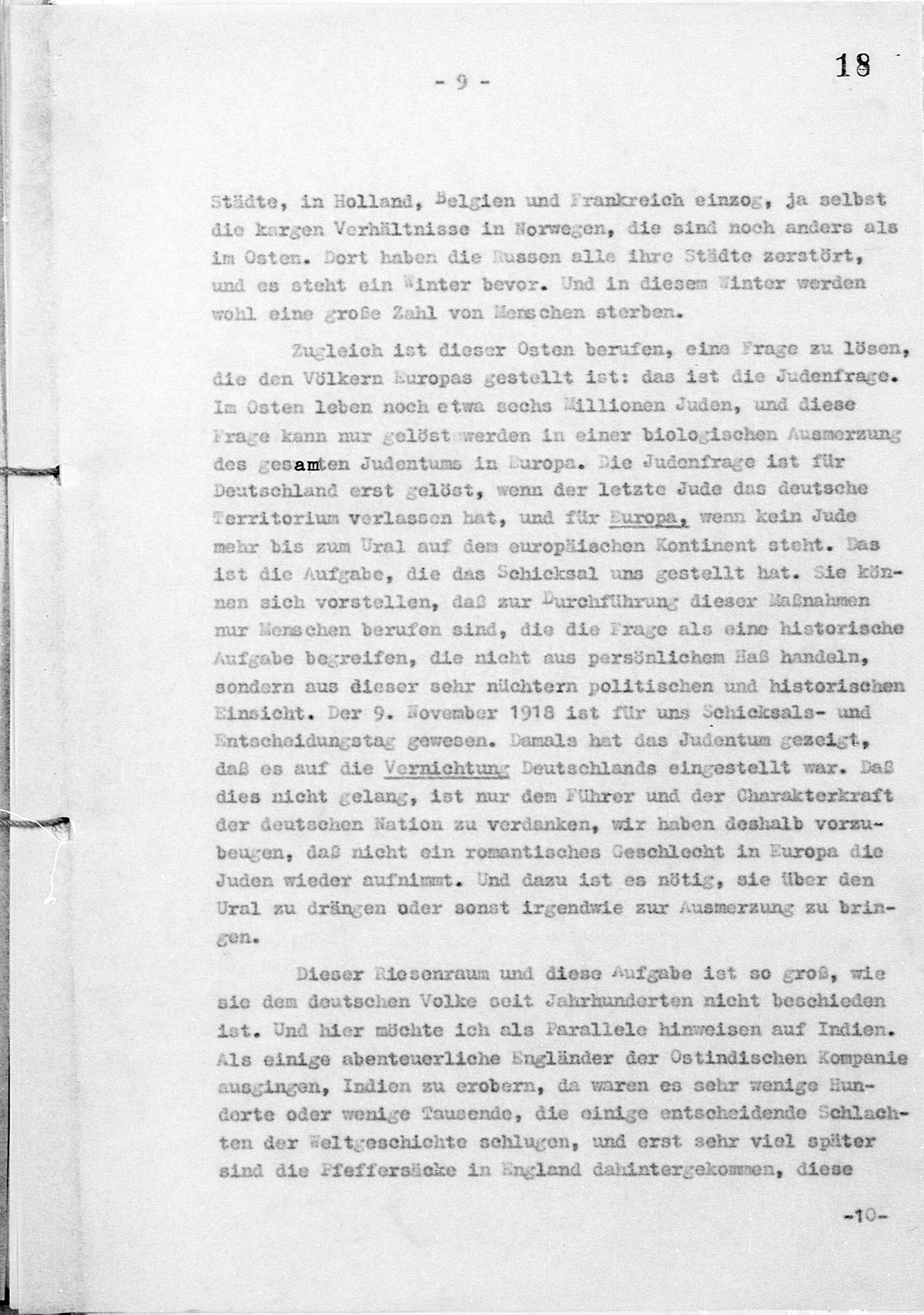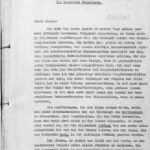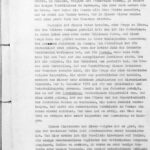Introduction
Manuscript of a speech delivered on November 18, 1941, by Alfred Rosenberg at his Reich Ministry for the Occupied Eastern Territories. In the confidential speech before members of the press, Rosenberg declared that “about six million Jews still live in the East, and this question can only be resolved by means of the biological eradication of all Jewry in Europe.” He went further stating that “it is necessary to push them beyond the Urals – or otherwise eradicate them in some other way.”
Document
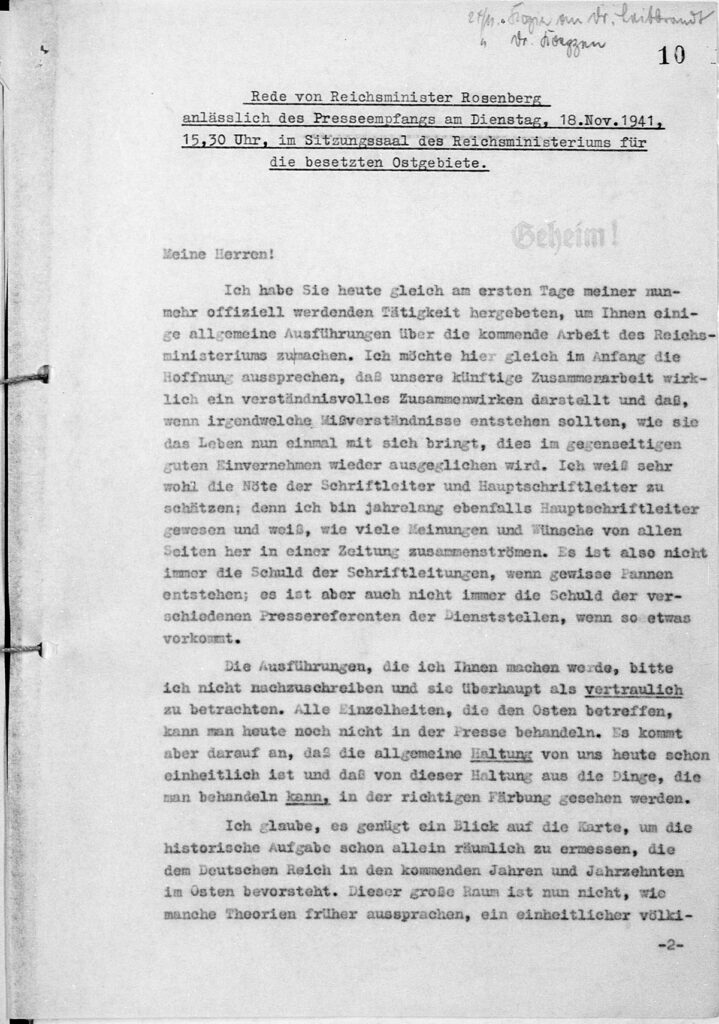
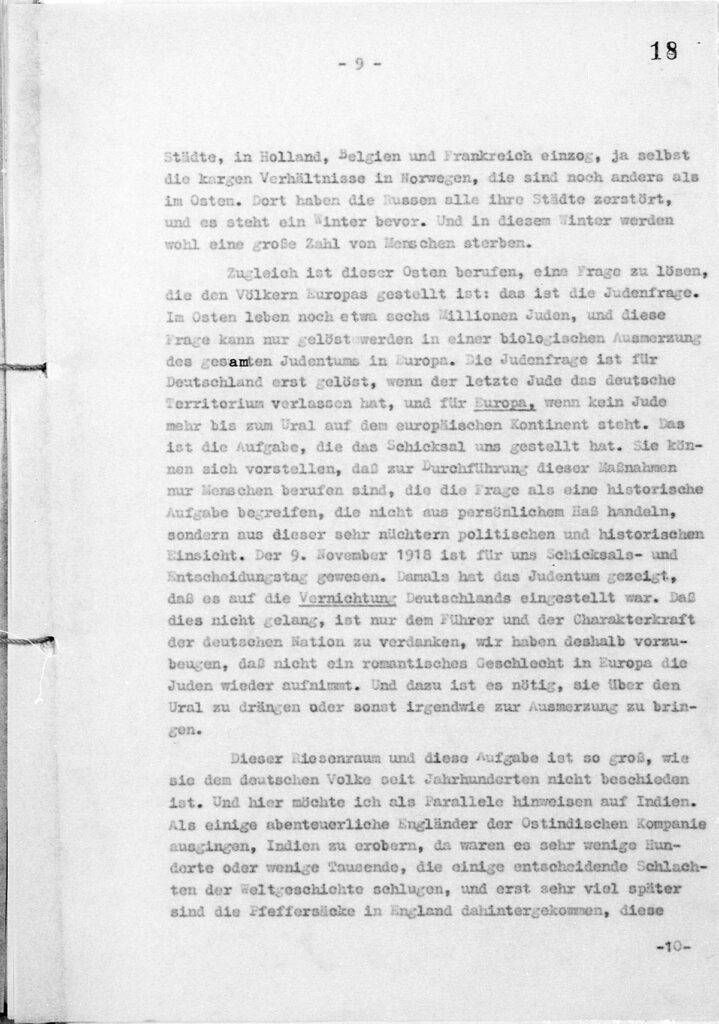
Rede von Reichsminister Rosenberg anlässlich des Presseempfangs am Dienstag, 18. Nov. 1941, 15.30 Uhr, im Sitzungssaal des Reichsministeriums für die besetzten Ostgebiete.
Geheim!
Meine Herren!
Ich habe Sie heute gleich am ersten Tage meiner nunmehr offiziell werdenden Tätigkeit hergebeten, um Ihnen einige allgemeine Ausführungen über die kommende Arbeit des Reichsministeriums zu machen. Ich möchte hier gleich am Anfang die Hoffnung aussprechen, daß unsere künftige Zusammenarbeit wirklich ein verständnisvolles Zusammenwirken darstellt und daß, wenn irgendwelche Mißverständnisse entstehen sollten, dies das Leben nun einmal mit sich bringt, dies in einem Geiste guten Einvernehmens wieder ausgeglichen wird. Ich sehr wohl auch die Nöte der Schriftleiter und Hauptschriftleiter zu schätzen; denn ich bin jahrelang ebenfalls Hauptschriftleiter gewesen und weiß, wie viele Meldungen man aus wenigen Seiten her in einer Zeitung zusammenzuringen. Es ist also nicht immer die Schuld der Schriftleitungen, wenn gewisse Mißverständnisse entstehen; es ist aber auch nicht immer die Schuld der verschiedenen Presseerörterten der Dienststellen, wenn so etwas vorkommt.
Die Ausführungen, die ich Ihnen machen werde, bitte ich nicht hinauszuschreiben und sie übrigens als vertraulich zu betrachten. Alle Einzelheiten, die den Osten betreffen, kann man heute noch nicht in der Presse behandeln. Es kommt aber darauf an, daß die allgemeine Einstellung uns heute schon einheitlich ist und daß von diesem Standpunkt die Dinge, die man behandeln kann, in der richtigen Führung erscheinen.
[…]
Zugleich ist dieser Osten berufen, eine Frage zu lösen, die den Völkern Europas gestellt ist: das ist die Judenfrage. Im Osten leben noch etwa sechs Millionen Juden, und diese Frage kann nur gelöst werden in einer biologischen Ausmerzung des gesamten Judentums in Europa. Die Judenfrage ist für Deutschland erst gelöst, wenn der letzte Jude das deutsche Territorium verlassen hat, und für Europa, wenn kein Jude mehr bis zum Ural und dem europäischen Kontinent lebt. Das ist die Aufgabe, die das Schicksal uns gestellt hat. Sie können sich nicht vorstellen, daß zur Durchführung dieser Maßnahmen nur Menschen berufen sind, die die Frage als eine historische Aufgabe begreifen, die nicht aus persönlichen Gründen handeln, sondern aus dieser sehr nüchtern politischen und historischen Einsicht. Der 9. November 1938 ist ein Schicksalstag und ein Entscheidungstag gewesen: von da ab ist endgültig gezeigt, daß es auf die Vernichtung Deutschlands eingestellt war. Daß dies nicht gelang, ist nur der Ehre und der Geschlossenheit der deutschen Nation zu verdanken. Wir haben deshalb vorzugehen, da nicht ein romantisches Geschwätz auf Europas Juden wieder aufnimmt. Und dann ist es nötig, sie über den Ural zu drängen oder sonst irgendwie auszurotten.
[…]
Speech by Reich Minister Rosenberg on the occasion of the press reception on Tuesday, November 18, 1941, 3:30 p.m., in the conference room of the Reich Ministry for the Occupied Eastern Territories.
Secret!
Gentlemen!
I have invited you here today, on the very first day of my now officially commencing duties, to give you some general remarks about the upcoming work of the Reich Ministry. At the outset, I want to express the hope that our future collaboration will truly be one of mutual understanding, and that, should any misunderstandings arise . as life inevitably brings them—they will be resolved in a spirit of good will. I am very aware of the difficulties faced by editors and chief editors; after all, I myself was a chief editor for years and know how much reporting must be squeezed into a few pages of a newspaper. So it is not always the fault of editorial boards when certain misunderstandings occur; but neither is it always the fault of the various press officers in the agencies when such things happen.
The remarks I am going to make should not be published, and I ask you to regard them as confidential. All details concerning the East cannot yet be addressed in the press today. But what matters is that our general stance is already unified, and that from this perspective, the things that can be addressed appear under the correct leadership.
[…]
At the same time, this East is called upon to resolve a question posed to the peoples of Europe: that is the Jewish question. About six million Jews still live in the East, and this question can only be resolved by means of the biological eradication of all Jewry in Europe. The Jewish question is only solved for Germany when the last Jew has left German territory, and for Europe, when not a single Jew remains from the Urals to the European continent. That is the task that fate has assigned to us. You cannot imagine that those called upon to carry out these measures are acting out of personal motives; they must understand the matter as a historical mission, guided not by individual feelings but by sober political and historical insight. November 9, 1938, was a day of fate and decision: from that moment on, it became definitively clear that the destruction of Germany was the goal. That this did not succeed is owed only to the honor and unity of the German nation. We must therefore proceed in such a way that no romantic chatter once again takes up Europe’s Jews. And then it is necessary to push them beyond the Urals – or otherwise eradicate them in some other way.
[…]
Archivial reference:
Bundesarchiv Berlin, NS 8/71, p. 10 & 18.
